Fat City (1972): the song of the defeated | la canción de los derrotados

Protagonizada por Stacy Keach & Jeff Bridges
I know that the same thing happens to many of you: you are watching a movie in which they talk about another movie and then you add that other movie to your endless to-watch list. The same with books, authors who refer to other authors, novels that contain quotes from others, etc. And of course it works the same when these two universes are mixed and, either we want to first read the book on which the film was based to watch it later, or we take note of the movies that are mentioned in the novel we're reading.
Sé que a muchos de ustedes les pasa lo mismo: están viendo una película en la que hablan de otra película y entonces agregan esa otra a su interminable lista de pendientes. Lo mismo con los libros, autores que remiten a otros autores, novelas que contienen citas de otras, etc. Y por supuesto funciona igual cuando estos dos universos se mezclan y, o bien queremos leer primero el libro en el que se basó la cinta para verla después, o tomamos nota de las películas que se mencionan en la novela que estamos leyendo.
That way, in an unexpected place, I found the name of this movie. I recently read for the third time the novel Soldiers of Salamis (Soldados de Salamina) by the Spanish writer Javier Cercas. I think it's one of the best novels that have been written in Spain in this century and I like the metafictional game of Cercas, in addition to the story. Now, what does the Spanish Civil War have to do with an American film from the seventies? In the third part of the book, my favorite part, Cercas introduces as a character a real friend of his, also a writer, the Chilean Roberto Bolaño, author of The Savage Detectives and 2666, among many other great literary works. In that part of the book, Cercas includes several conversations between him and his Chilean colleague and in one of those, talking about another character, both evoke their memory of this John Huston film. This last name may not be familiar to you, but you certainly remember hearing about The Man Who Would Be King (with Sean Connery, Michael Caine and Christopher Plummer), The Maltese Falcon and The Treasure of the Sierra Madre (both starring by Humphrey Bogart), The Asphalt Jungle, Moby Dick with Gregory Peck, The Unforgiven with Burt Lancaster and the immortal Audrey Hepburn, The Misfits with Clark Gable and Marilyn Monroe and Reflections in a Golden Eye with two luxury protagonists: Elizabeth Taylor and Marlon Brando. Well, in the credits of each of these films the same name appears under the Director label: John Huston.
De esa forma, en un lugar inesperado, encontré el nombre de esta película. Hace poco leí por tercera vez la novela Soldados de Salamina (Soldiers of Salamis) del escritor español Javier Cercas. Creo que es de las mejores novelas que se han escrito en España en este siglo y me gusta el juego metaficcional de Cercas, además de la historia. Ahora bien, ¿qué tiene que ver la guerra civil española con una película norteamericana de los años setenta? En la tercera parte del libro, mi parte favorita, Cercas introduce como personaje a un amigo real suyo, también escritor, el chileno Roberto Bolaño, autor de Los detectives salvajes y 2666, entre muchas otras grandes obras literarias. En esa parte del libro, Cercas incluye varias conversaciones entre él y su colega chileno y en una de esas, hablando de otro personaje, ambos evocan su recuerdo de esta película de John Huston. Tal vez este último nombre no les resulte familiar, pero de seguro sí recuerdan haber oído hablar de The Man Who Would Be King (con Sean Connery, Michael Caine y Christopher Plummer), The Maltese Falcon y The Treasure of the Sierra Madre (ambas protagonizadas por Humphrey Bogart), The Asphalt Jungle, Moby Dick con Gregory Peck, The Unforgiven con Burt Lancaster y la inmortal Audrey Hepburn, The Misfits con Clark Gable y Marilyn Monroe y Reflections in a Golden Eye con dos protagonistas de lujo: Elizabeth Taylor y Marlon Brando. Bueno, en los créditos de cada una de estas películas aparece un mismo nombre bajo la etiqueta de Director: John Huston.
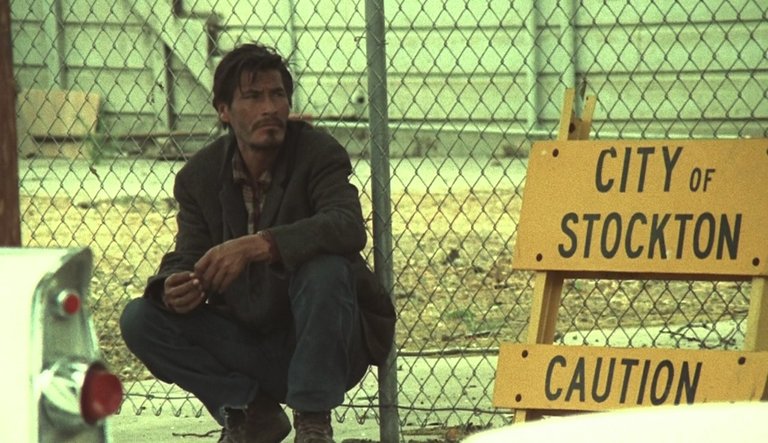
So when at the beginning of the seventies Huston wanted to tell us this story about defeat, he already had a lot of experience and that's why he made this story shine and made memorable a movie that in the hands of another director would have been full of pathos. Because Fat City is not a success or redemption story. There are characters who dream, yes, but their dreams escape them, life hits them again and again, literally and figuratively, and they remain on the ground.
Así que cuando a principios de los años setenta Huston quiso contarnos esta historia sobre la derrota contaba ya con muchísima experiencia y por eso hizo lucir y volvió memorable una historia que en manos de otro director habría estado cargada de patetismo. Porque Fat City no es una historia de éxito o de redención. Hay personajes que sueñan, sí, pero sus sueños se les escapan, la vida los golpea una y otra vez, literal y figurativamente, y ellos se quedan en el suelo.
Let's start with the place: the story is set in Stockton, a California city that is nothing like Los Angeles, there's none of the glamor of Hollywood and Sunset Boulevard, just a dozen bars, half-destroyed residences, erratic drunks, day laborers who work in the crops and a lot of people who escape as best they can (alcohol, drugs, sex) from a life that can be routine and boring. It's in that environment that Billy Tully (Stacy Keach) lives, a man who was a professional boxer years ago and who could have been a world champion, but he never did and no longer boxes. One day, by chance, he meets a boy named Ernie Munger (a very young Jeff Bridges) in a gym who seems to have what it takes to make a name for himself in the world of boxing. Although Ernie doesn't dream of becoming a boxer, Billy convinces him to visit his old manager, so that he can train him and take him to the stages that will make him famous and earn him a lot of money. But Fat City is not Rocky or The Fighter and we soon realize that the manager, like his other boys, boxers that he puts to compete in the ring, are all losers. They prepare, yes. They have some talent and they train, yes. But they enter the ring with a desire to win and come down from it with bleeding faces and wounded pride. Hence, Ernie's promising career never comes to anything.
Comencemos por el lugar: la historia se ambienta en Stockton, una ciudad de California que no se parece en nada a Los Angeles, no hay nada del glamour de Hollywood y Sunset Bolevard, sólo una decena de bares, residencias a medio destruir, borrachos erráticos, jornaleros que trabajan en las cosechas y un montón de gente que se evade como puede (alcohol, drogas, sexo) de una vida que puede resultar rutinaria y aburrida. Es en ese ambiente en el que vive Billy Tully (Stacy Keach), un hombre que fue boxeador profesional años atrás y que pudo haber sido campeón mundial, pero nunca lo consiguió y ya no boxea. Un día, de casualidad conoce en un gimnasio a un muchacho llamado Ernie Munger (un jovensísimo Jeff Bridges) que parece tener lo que se necesita para hacerse un nombre en el mundo del boxeo. A pesar de que Ernie no sueña con convertirse en boxeador, Billy lo convence de que visite a su antiguo mánager, para que lo entrene y lo lleve a los escenarios que lo harán famoso y le harán ganar muchísimo dinero. Pero Fat City no es Rocky ni The Fighter y pronto nos damos cuenta de que el mánager, al igual que sus demás muchachos, boxeadores que él pone a competir en el ring, son todos unos perdedores. Se preparan, sí. Tienen algo de talento y entrenan, sí. Pero suben al ring con un deseo de triunfo y descienden de él con el rostro sangrante y el orgullo herido. De allí que la prometedora carrera de Ernie no llegue nunca a nada.
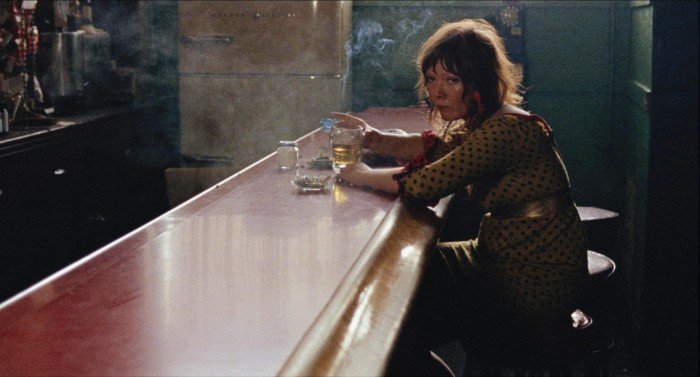
At the same time, we see other scenes and meet other characters who also lost in the game of life, as is the case of Oma, played exceptionally by Susan Tyrrell, a widow with a volatile, difficult character and addicted to alcohol. We also see a little of the work in the field in which day laborers are hired to complete intense and exhausting days in exchange for a miserable salary, which is why it's a place where children, illegal immigrants, the elderly, or all those who cannot aspire to a better job for some reason or another are found. When someone doesn't have a job and is somewhat desperate or cannot find another option, they go at dawn to the places where the trucks arrive to hire labor for different crops. It's the club of the defeated. And there goes Billy. But what happened to Tully? If he was as good a boxer as he says, why didn't he succeed? Why doesn't he box again? All these questions are answered as the film progresses and something in the scenes, in the mood of the protagonists or in the slow and mediocre atmosphere of Stockton convinces us that he will not make it. Neither him nor anyone in that city. A little of that is mentioned by Bolaño and his interlocutor in the novel by Javier Cercas where they talk about a date in Stockton as an internal joke between the characters, but which I inevitably thought about when Fat City ended in that eloquent silence of two men who speak of the happiness of the simple: enlightenment and wisdom or simple resignation?
A la par de eso vamos viendo otras escenas y vamos conociendo otros personajes que también perdieron en el juego de la vida, como es el caso de Oma, interpretada de forma excepcional por Susan Tyrrell, una mujer viuda de carácter volátil, difícil y adicta al alcohol. También vemos un poco del trabajo en el campo en el cual los jornaleros son contratados para cumplir intensas y agotadoras jornadas a cambio de un salario mísero, razón por la cual es un lugar en el que se encuetran niños, ilegales, ancianos, o todos aquellos que no pueden aspirar a un mejor trabajo por alguna razón u otra. Cuando alguien no tiene trabajo y está algo desesperado o no encuentra otra opción, va de madrugada a los lugares a los que llegan los camiones para contratar mano de obra para diferentes cosechas. Es el club de los derrotados. Y allí va Billy. Pero, ¿qué le pasó a Tully? si era tan buen boxeador como dice ¿por qué no triunfó? ¿por qué no vuelve a boxear? Todas estas preguntas se van respondiendo a medida que avanza la película y algo en las escenas, en el ánimo de los protagonistas o en el ambiente parsimonioso y mediocre de Stockton nos convencen de que no lo logrará. Ni él ni nadie en esa ciudad. Un poco de eso es mencionado por Bolaño y su interlocutor en la novela de Javier Cercas en donde se habla de una cita en Stockton como un chiste interno entre los personajes, pero en la que me fue inevitable pensar cuando Fat City terminó en ese elocuente silencio de dos hombres que hablan de la felicidad de lo simple ¿iluminación y sabiduría o simple resignación?
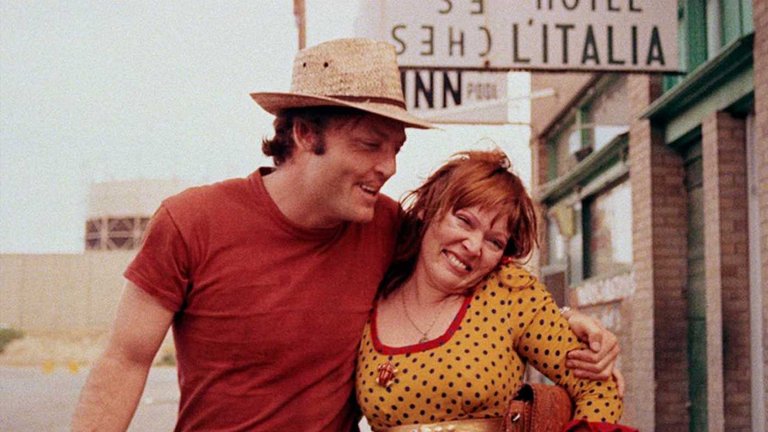
Huston's direction is excellent, Leonard Gardner's screenplay, adapted from a novel of his, is perfect, and Conrad L. Hall's photography is just what the story needed. The performances are excellent, especially those of Keach and Tyrrell, and the soundtrack couldn't be better: the song Help Me Make It Through the Night, written, composed and performed by Kris Kristofferson, talks about loneliness and the need to have someone when things get tough. Plus, it's a country ballad that, to my ears, sounds like what you see in Fat City. Those who like sports movies, the ones in which against all odds the underdogs grow and triumph, the poor orphan becomes an international star and in the end the protagonist makes it, may be disappointed with this movie. Just as those who enjoy satires about defeat, those black comedies in the style of Inside Llewyn Davis, will also feel somewhat disappointed, because although in Fat City there are moments to laugh, they are not those that are associated with the concept of lose. This film is not an exaltation of defeat as a means of learning to live, it doesn't take the task of instructing and saying losing is not so bad. No. What Fat City says is yes, losing sucks, we all want to win, but not all of us can fulfill our dreams. Some of us were born to be defeated and despite that, life goes on. However, maybe that last dialogue between Billy and Ernie means a refuge of hope, I don't know, you should see it and give me your opinion, did any of you know this movie? I read you in the comments.
La dirección de Huston es excelente, el guión de Leonard Gardner, adaptado a partir de una novela suya, es perfecto y la fotografía de Conrad L. Hall es justo lo que la historia necesitaba. Las actuaciones son excelentes, especialmente las de Keach y Tyrrell y la banda sonora no podía ser mejor: la canción Help Me Make It Through the Night, escrita, compuesta e interpretada por Kris Kristofferson, habla de la soledad y de la necesidad de tener a alguien cuando las cosas se ponen difíciles. Además, es una balada country que, a mis oídos, suena a lo que uno ve en Fat City. Quienes gustan de las películas sobre deportes, esas en las que contra todo pronóstico los menos favorecidos crecen y triunfan, el huérfano pobre se convierte en una estrella internacional y al final el protagonista lo consigue, tal vez se sientan decepcionados con esta película. Como también se sentirán algo decepcionados aquellos que disfrutan las sátiras sobre la derrota, esas comedias negras al estilo de Inside Llewyn Davis, porque aunque en Fat City hay momentos para reír, no son los que se asocian al concepto de perder. Esta película tampoco es una exaltación de la derrota como medio para aprender a vivir, no se toma la tarea de aleccionar y decir perder no es tan malo. No. Lo que Fat City dice es sí, perder apesta, todos queremos ganar, pero no todos podemos cumplir nuestros sueños. Algunos nacimos para ser derrotados y a pesar de eso, la vida sigue. Sin embargo, tal vez, ese último diálogo entre Billy y Ernie signifique un reducto de esperanza, no lo sé, tendrían que verla y darme su opinión, ¿alguno de ustedes conocía esta pelícual? Los leo en los comentarios.
Reviewed by | Reseñado por @cristiancaicedo
Other posts that may interest you | Otros posts que pueden interesarte:
 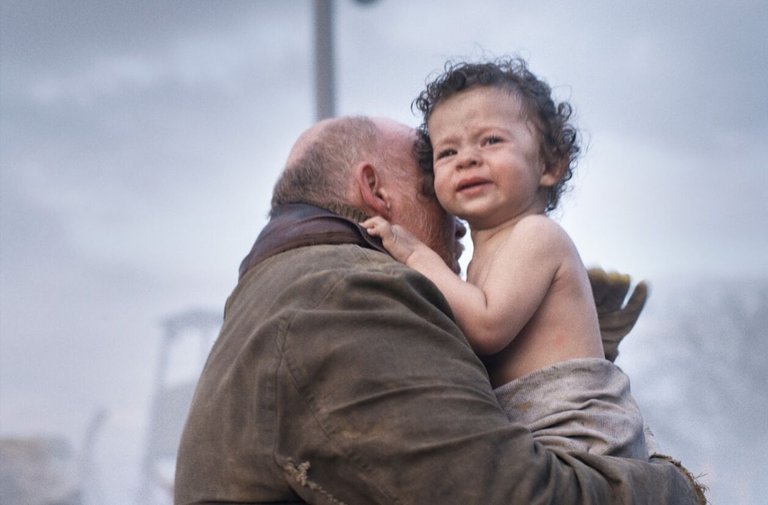 |
|---|
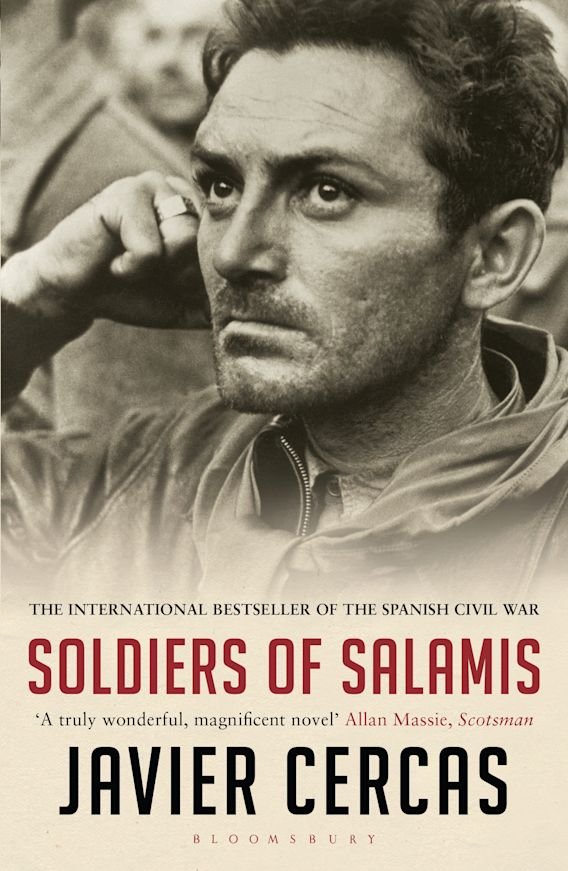
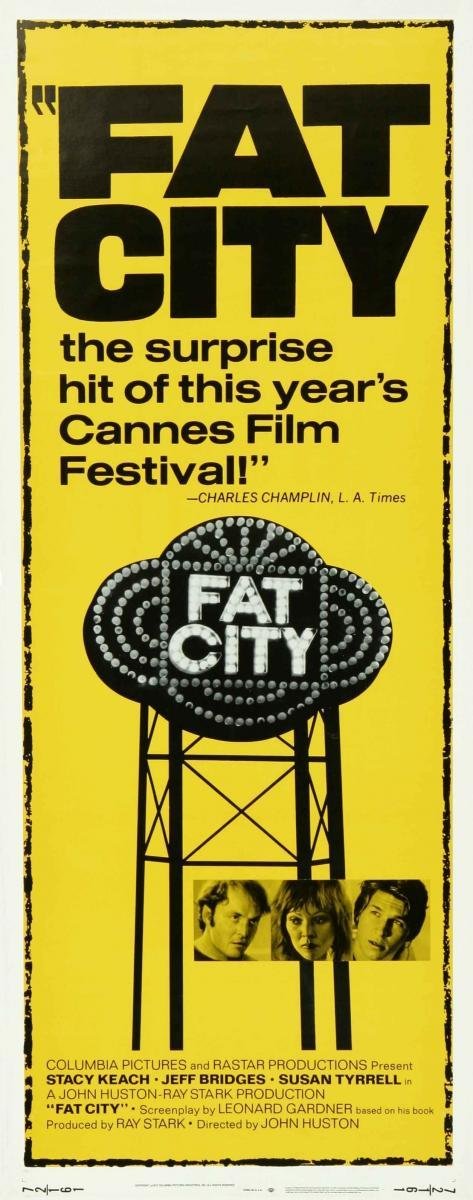
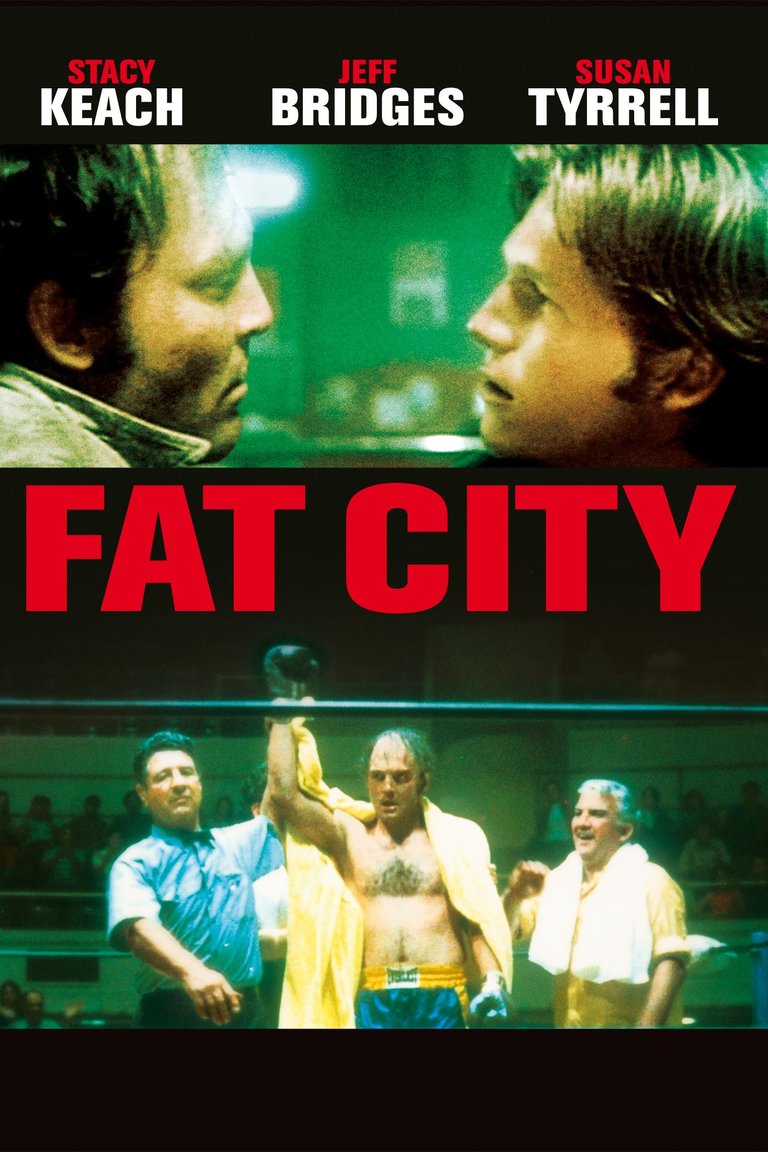

Saludos. No he leído Soldados de Salamina, sí, Anatomía de un instante del mismo Cercas. Me pasa igual que a tí, llego a libros y películas por comentarios que se hacen en otros que estoy leyendo. Gracias por tu estupenda reseña estimado @cristiancaicedo. Un fuerte abrazo desde Maracay.
Tuve ese título de Cercas cuando vivía en Barquisimeto, pero me vine sin leerlo. Te recomiendo - del mismo autor - una novela corta llamada "El móvil". Saludos desde Santiago de Chile @irvinc
From Venezuela, our witness drives decentralization and the adoption of Web3 technology, creating opportunities for the local community and contributing to the global ecosystem. // Desde Venezuela, nuestro testigo impulsa la descentralización y la adopción de la tecnología Web3, generando oportunidades para la comunidad local y contribuyendo al ecosistema global.
Sigue, contacta y se parte del testigo en: // Follow, contact and be part of the witness in: